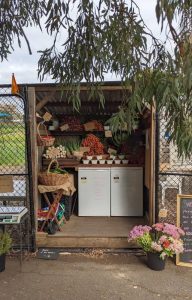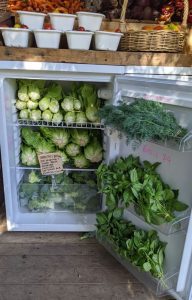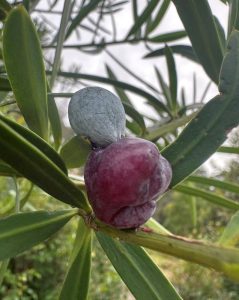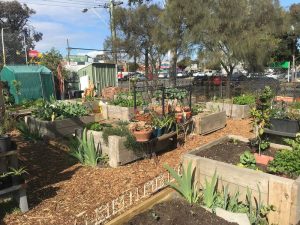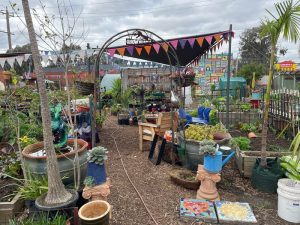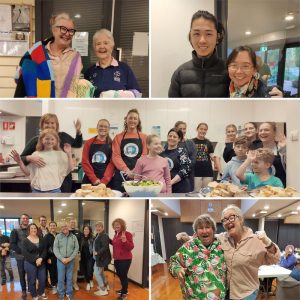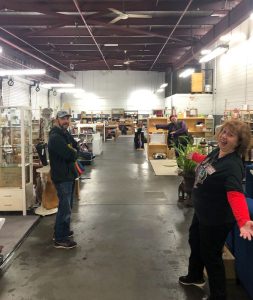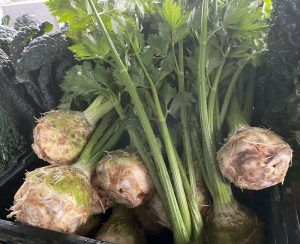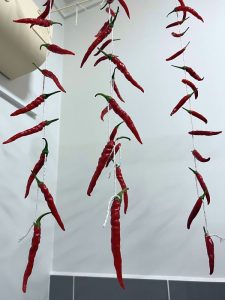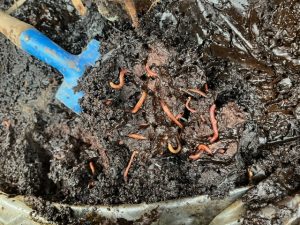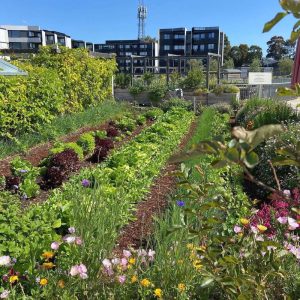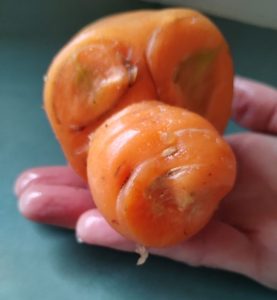Thanks to the people who have contributed to this week’s newsletter: Ann Stanley, Bev Middleton, Christine Reading, Ebony Addinsall, Jennifer Chellew, Kellie Wishart and Michelle Smythe.
The Edible Forest recently featured on Gardening Australia
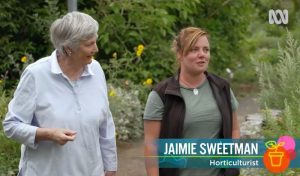 The Edible Forest, a 1 acre food forest in Dixons Creek, featured on Gardening Australia last Friday (16th June). Watch the 8 minute video starring owner Louise Ward and head gardener Jaimie Sweetman.
The Edible Forest, a 1 acre food forest in Dixons Creek, featured on Gardening Australia last Friday (16th June). Watch the 8 minute video starring owner Louise Ward and head gardener Jaimie Sweetman.
Yes, that’s our very own Jaimie Sweetman, who writes about unusual edible plans for this newsletter!
If you have never been to the Edible Forest, it is well worth a visit. Tours, often led by Jaimie, take place on Fridays and Saturdays – read more and book your place on a future tour. Note that they are closed during June and July.
The new, Melbourne community radio show – ‘Local Food Connections’ – is about to start
‘Local Food Connections’ will be on 3CR every Sunday morning, 10-10.30am, from 25th June onwards. “A show about the power of locally grown food to connect us more strongly with our communities and the land we inhabit.” Tune into the station or listen to the livestream at https://www.3cr.org.au/streaming.
The show will be hosted by our very own Ann Stanley, who conducts interviews for this newsletter! And it is sponsored by Local Food Connect.
CareNet has a new initiative – The Social Grocer
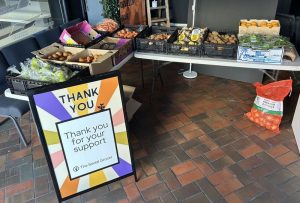 CareNet, who are based in Templestowe, are a food relief organisation that rescues surplus food from local businesses and groups and makes it available to the community. In addition to their longstanding hamper program and mobile pantry, they have now started a social enterprise called The Social Grocer where their customers can go and help themselves to whatever they would like and are encouraged to pay what they can. It is a sustainability initiative that aims to reduce food waste and increase food accessibility. It is for anyone in the community to participate in, not just those experiencing hardship. All profits go towards CareNet’s food relief program. The Social Grocer is currently open every Thursday, 10am-midday and is located at the Manningham Christian Centre, 143-145 Parker Street, Templestowe.
CareNet, who are based in Templestowe, are a food relief organisation that rescues surplus food from local businesses and groups and makes it available to the community. In addition to their longstanding hamper program and mobile pantry, they have now started a social enterprise called The Social Grocer where their customers can go and help themselves to whatever they would like and are encouraged to pay what they can. It is a sustainability initiative that aims to reduce food waste and increase food accessibility. It is for anyone in the community to participate in, not just those experiencing hardship. All profits go towards CareNet’s food relief program. The Social Grocer is currently open every Thursday, 10am-midday and is located at the Manningham Christian Centre, 143-145 Parker Street, Templestowe.
As the organiser, Kellie Wishart says, “We have big plans for The Social Grocer. Ultimately we would like to be in a shop front, we would like to offer coffee and sweets and also stock a range of new to market sustainable products.”
Correction of a really bad typo – Farm Raiser
Last week, I talked about how Farm Raiser was expanding its farm gate. My precise words were “their farm gate opposite at 12 Perkins Avenue, Bellfield is not open on Saturdays (9am-midday) as well as Fridays (10am-2pm).” (Obviously?) I should have said “now open on Saturdays (9am-midday)” rather than “not open“.
My apologies to Caitlin, Charlotte, Eve, Kirsty and Patrick.
Here is the correct announcement: Their farm gate opposite at 12 Perkins Avenue, Bellfield is now open on Saturdays (9am-midday) as well as Fridays (10am-2pm).
Want to intern at a Certified Organic farm?
Day’s Walk Farm is a Certified Organic farm based in Keilor which grows seasonal vegetables. They run a structured intern program from September to December. This can facilitate early steps into the world of agriculture and is suitable for keen learners of either organic market gardening or agroecology. Applications are now open and close 7th July. Read more and potentially apply.
Your weekly facts about earthworms
Bev Middleton, from Soil Week Australia: earthworms are both strong and athletic. They can lift objects that weigh up to 50 times their own body weight, which is (sort of) like a human lifting a small car. They can travel through soil at a speed of about 45 centimetres per hour, which is (sort of) like a human running at 480 kilometres per hour.
Charles Darwin via Guy Palmer:
- Each year (at least in Darwin’s garden), earthworms swallow and excrete around a 0.5 cm thick layer of soil (so 5cm in 10 years, and then more slowly).
- This equates to around 10 tons on an acre of land.
- It involves around 50,000 worms at any one time who collectively weigh around 160Kg.
- So, anything larger than the worms can swallow gradually sinks.
- Which, in turn, preserves these larger objects.
- So, archaeologists ought to be grateful!
Soil Week Australia is currently running a competition for school students on the topic of ‘wonderful worms’. Read more and potentially enter.
Another limerick
Last week, I gave a couple of example limericks generated by the ChatGPT artificial intelligence software. In reaction, Jennifer Chellew has sent in a limerick about me (Guy) produced by a human (i.e. Jennifer) “with no artificial intelligence added“.
Loving the newsletter produced by Guy
Telling of pests like the Queensland fruit fly
It hints what to grow
Suggests when to sow
and lists markets with organics to buy.
Every newsletter needs a good picture
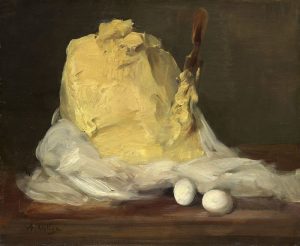 Mound of butter is a painting by French realist painter Antoine Vollon completed in 1885. The painting has visible thick brush strokes which are probably meant to illustrate the marks after the butter knife was used to spread butter. In those days, there were (obviously) no fridges and butter was usually stored wrapped in a cheesecloth in a cool place.
Mound of butter is a painting by French realist painter Antoine Vollon completed in 1885. The painting has visible thick brush strokes which are probably meant to illustrate the marks after the butter knife was used to spread butter. In those days, there were (obviously) no fridges and butter was usually stored wrapped in a cheesecloth in a cool place.
See more food-related art on our website.
Which link was clicked most times in the last newsletter?
The most popular link in the last newsletter was Duncan Cocking’s article on how to grow blueberries.
If you are interested in growing blueberries, you might also be interested in both Robin Gale-Baker’s article and Jian Liu’s article on the subject.
Word of the month – Slumgullion
‘Slumgullion’, meaning a watery, inferior or insubstantial stew.
Read about previous words of the month.
Proverb (or phrase) of the month
By the skin of your teeth. Meaning: Something just barely accomplished; a narrow escape. This is a phrase from the Bible where (in the King James Version) Job is tortured by Satan and then says “My bone cleaveth to my skin and to my flesh, I am escaped with the skin of my teeth.” Obviously teeth don’t have skin so the reference might be to any of gums, enamel or skull.
There are actually lots of figurative phrases in English which relate to teeth. For example, armed to the teeth, as rare as hen’s teeth, better than a kick in the teeth, cut your teeth on, fed up to the back teeth, get your teeth into, give your eye teeth, kick in the teeth, lie through your teeth, like pulling teeth, set your teeth on edge, and through gritted teeth.
Read about more food-related proverbs.
Gardening quote of the month
“When the world wearies and society ceases to satisfy there is always the garden.” by Minnie Aumonier.
This quote was submitted by Christine Reading, who says “Now in my late 70’s, my small garden is my joy and l love making ‘tussie-mussies’ (small fragrant posies) to give away to brighten peoples’ day. Minnie Aumonier’s quote was given to me around 50 years ago by my gardening mentor.” Thanks, Christine!
 Joke (or pun) of the week
Joke (or pun) of the week
If you’re waiting for a waiter at a restaurant, have you also become a waiter?
Regular activities over the coming week
Farmers’ and other food markets
- Friday: Community Grocer, Carlton.
- Saturday: Carlton and Coburg.
- Sunday: Alphington and Eltham.
- Tuesday: Community Grocer, Fitzroy.
- next Wednesday: Really Really Free Market (Coburg).
Food swaps
- Saturday: Blackburn North, Brunswick East, Heidelberg, Hurstbridge and Preston/Thornbury.
- Sunday: Collingwood Yards and Eltham.
Community gardens
- Thursday: Diamond Valley Library (Greensborough), Edible Hub (Hurstbridge), SEEDs (Brunswick) and Whittlesea.
- Friday: Reynard Street (Coburg) and West Brunswick.
- Saturday: Bulleke-bek Park (Brunswick), Links (Lalor), Macleod, Sylvester Hive (Preston) – Winter Solstice celebration and Thrive (Diamond Creek).
- Sunday: Bellfield, Creeds Farm (Epping), Fawkner Food Bowls, Merri Corner (Brunswick East), Pentridge (Coburg), Regent (Reservoir) (including Japanese cooking class) and West Brunswick.
- Monday: Panton Hill, SEEDs (Brunswick) and Whittlesea.
- Tuesday: Doncaster Hill and Watsonia Library.
- Next Wednesday: Bellfield, Eltham Neighbourhood House, Macleod, Newton Street (Reservoir), Span (Thornbury) and Sylvester Hive (Preston) .
Upcoming face-to-face events – not cooking
Worm farms and composting; Wednesday, 28th June, 10am-midday; free; Fawkner.
Develop the skills you need to help your plants thrive and make your home gardening more sustainable with advice from their specialist horticulture team. Get your hands dirty as you learn to build a worm farm and create a compost heap. Complimentary coffee and morning tea will be served. Organised by The Greater Metropolitan Cemeteries Trust.
Introduction to permaculture (2 sessions); Saturdays 29th July and 5th August, both 10am-3pm; $150 ($15 per hour); Coburg.
Learn permaculture fundamentals in this hands-on course, combining concepts and practices of sustainability, gardening, horticulture, ecology, community development and design thinking. Organised by Reynard Street Neighbourhood House.
Grafting and tree sales day; Saturday, 5th August, 10am-midday; free; CERES.
Purchase scion/budwood from a wide range of varieties of apples and other fruits. Purchase 2-year-old ready-to-plant apple and plum trees. The session will also include a grafting demonstration. Organised by the Heritage Fruits Society.
Grafting and tree sales day; Sunday, 6th August, 10am-midday; free; Templestowe.
Purchase scion/budwood from a wide range of varieties of apples and other fruits. Purchase 2-year-old ready-to-plant apple and plum trees. The session will also include a grafting demonstration and a tour of the orchard. Organised by the Heritage Fruits Society.
Fermenting workshop; Saturday, 12th August, 10am-1pm; $100 ($33 per hour); Kinglake.
The Fermented Mumma will teach you all you need to know to starting fermenting at home. Menu: sauerkraut, carrot kimchi and fermented garlic onions.
SEEDs Soup Festival; Sunday, 13th August, 11am-5pm; free; Brunswick.
Join them in celebrating SEEDs Communal Garden at their annual ‘winter soup’ fundraiser, where the where soup is made from locally sourced and community grown produce. There will be workshops, garden grown meals, a mini market, live music and dancing.
DIY mushrooms; Sunday, 20th August, 10am-4pm; $175 ($29 per hour); CERES.
Presenter: Buttons Mira from The Mushroomery. You will be shown the secrets to successfully growing mushrooms at home. You will learn the growing methods for oyster and shitake mushrooms, including inoculation and sterilisation, and be introduced to basic mycology. You will undertake practical sessions and learn how to start master cultures.
In June
- Cooking up compost; Thursday, 22nd June, 6-7pm; free; Kilsyth.
- Grow your own seedlings; Saturday, 24th June, 9-11am; $20 ($10 per hour); Preston.
- Drink bottle carrier; Saturday, 24th June, 10am-3pm; $30 ($6 per hour); Kinglake.
- Growing berries; Saturday, 24th June, 10am-3pm; $120 ($24 per hour); CERES.
- Introduction to chocolate tasting; Saturday, 24th June, midday-1.30pm; $33 ($22 per hour); Brunswick East.
- Food photography; Sunday, 25th June, 9.30am-12.30pm; $109 ($36 per hour); Eltham.
- Worm farms and composting; Wednesday, 28th June, 10am-midday; free; Fawkner.
- Lauren Mueller on edible weeds; Wednesday, 28th June, 8-10pm; free; Preston.
In July
- Winter fruit tree pruning workshop; Saturday, 1st July, 9am-1pm; $65 ($16 per hour); Edendale.
- Introduction to garden bed construction, power tools and hand tools; Sunday, 2nd July, 10am-1pm; $160 ($53 per hour); Mount Evelyn.
- Beeswax wrap workshop; Sunday, 2nd July, 11am-1pm; $55 ($28 per hour); Brunswick.
- Fruit tree essentials, pruning and maintenance with Karen Sutherland; Wednesday, 5th July, 6.30-8.30pm; free; Doncaster.
- Wicking bed workshop; Thursday, 6th July, 10am-2pm; $45 ($11 per hour); Panton Hill.
- Make your own reusable produce bags; Friday, 7th July, 10am-12.45pm; free; Croydon Hills.
- Wild mushroom foraging and fermentation for beginners; Saturday, 8th July, 10am-3pm; $180 ($60 per hour); Mount Evelyn.
- Winter alcohol-free wine tasting; Saturday, 8th July, 2-3pm; $22 ($22 per hour); Abbotsford.
- Edible weeds; Sunday, 9th July, 10am-midday; $60 ($30 per hour); CERES.
- Introduction to horticulture (8 sessions); Monday for 8 weeks, starting 10th July, 10am-2.30pm; $70 ($2 per hour); Eltham.
- Permaculture Design Course (10 sessions); Tuesdays 9am-3pm, 11th July to 5th September; $595 ($9 per hour); Ringwood.
- Pruning and care of fruit trees; Saturday, 15th July, 10am-3pm; $120 ($24 per hour); CERES.
- Small changes, big impact (kitchen edition) workshop; Saturday, 15th July, 11.30am-1pm; free; Ringwood.
- Plants and permaculture; Sunday, 16th July, 10am-3pm; $120 ($24 per hour); CERES.
- Winter/waring fruit tree pruning; Sunday, 16th July, 10.30am-12.30pm; $20 ($10 per hour); Preston.
- Complete urban farmer (14 sessions); weekly sessions starting Thursday, 20th July, 9am-3pm; $895 ($11 per hour); CERES.
- Mushroom foraging; Thursday, 20th July, 6.30-8.30pm; $85 ($43 per hour); Collingwood.
- Winter alcohol-free wine tasting; Saturday, 22nd July, 2-3pm; $22 ($22 per hour); Abbotsford.
- Beeswax wraps; Sunday, 23rd July, 10am-midday; $80 ($40 per hour); CERES.
- Growing an abundance of organic food; Sunday, 23rd July, 10am-1pm; $165 ($55 per hour); Mount Evelyn.
- The fungus amongst us; Saturday, 29th July, 10am-12.30pm; $60 ($24 per hour); Alphington.
- How to become self reliant workshop; Saturday, 29th July, 10am-1pm; $165 ($55 per hour); Mount Evelyn.
- Introduction to permaculture (2 sessions); Saturdays 29th July and 5th August, both 10am-3pm; $150 ($15 per hour); Coburg.
- Autoimmune disease; Sunday, 30th July, 11am-12.30pm; free; Richmond.
- Backyard beekeeping basics; Sunday, 30th July, 11am-1pm; $80 ($40 per hour); CERES.
In August
- Rod Heather on growing and grafting fruit trees.; Tuesday, 1st August, 7.15-9.15pm; $4; Hurstbridge.
- Garden design with Kat Lavers; Wednesday, 2nd August, 6.30-8.30pm; free; Doncaster.
- Grafting and tree sales day; Saturday, 5th August, 10am-midday; free; CERES.
- Winter fruit tree pruning with Chris England; Saturday, 5th August, 10am-1pm; $70 ($23 per hour); Richmond.
- Permaculture Design Course (100 hours); mostly Wednesday evenings, starting 5th August, 6.30-9.30pm; $2,200 ($22 per hour); CERES.
- Grafting and tree sales day; Sunday, 6th August, 10am-midday; free; Templestowe.
- How to drink Australian (book launch); Monday, 7th August, 6-9pm; $30 ($10 per hour); Abbotsford.
- Grocery bill savings workshop with Open Table; Wednesday, 9th August, 4-5pm; free; Carlton.
- SEEDs Soup Festival; Sunday, 13th August, 11am-5pm; free; Brunswick.
Regular events
- Beekeeping workshop; roughly once a month on Saturdays, 1-3.30pm; $85 ($34 per hour); Brunswick East.
- Eltham trails (walking food tour); various Saturday mornings and Thursday evenings; $65 ($22 per hour); Eltham.
- Flavours of Coburg food tour; 3rd Saturday of each month, 10am-1pm; $65 ($22 per hour); Coburg.
- Gin making masterclass; most Saturdays, 10am-1pm; $175 ($58 per hour); Nunawading.
- Gin masterclass; most Saturdays and Sundays, midday-1pm; $80 ($80 per hour); Eltham.
- Ratio Cocoa Roasters behind the scenes chocolate factory tour; various Fridays and Saturdays; $20 ($14 per hour); Brunswick.
- Spoon carving workshop; various Saturdays and Sundays, 10am-1pm; $130 ($43 per hour); Coburg North.
- Truffle workshop at Ratio Cocoa Roasters; 3rd Sunday of each month, 11am-1pm; $75 ($38 per hour); Brunswick.
- Wine tasting masterclass; Saturdays, 3-5pm; various prices; Northcote.
Upcoming face-to-face events – cooking
Chai tea blending; Monday, 10th July, 10.30-11.30am; free; Eltham.
Learn how to blend chai tea, connect with others and have a chat. Take your own jar and you can take your chai blend home. Organised by Eltham Library.
The cook program (10 sessions); on Thursdays, 9.30am-1.30pm, starting 13th July; $50 ($1 per hour); Brunswick.
The objective is for you to develop skills, social connection, and self-confidence to seek further study or work in hospitality. You will prepare, eat and gain an overview of different styles and types of cooking. You will also learn how to cook for a large group. Organised by Brunswick Neighbourhood House.
Beginners cheese making class; Saturday, 15th July, 10am-5pm; $250 ($50 per hour); Thomastown.
What you will learn: how to make hand-stretched fresh mozzarella and create bocconcini; how to make primo sale; and how to make fresh ricotta. What you will get: Italian style lunch; and primo sale and freshly made mozzarella to take home. Organised by That’s Amore Cheese.
Milk kefir magic; Tuesday, 1st August, 6.30-8.30pm; $125 ($63 per hour); Fitzroy North.
They will show you how to easily incorporate this little SCOBY into your daily routine. You will make some milk kefir and then move onto flavouring, making butter, labneh, catching the whey and then making a naturally fizzy and gut-loving soda. You’ll go home with: a milk kefir SCOBY in a jar and ready to feed when you get home; a whey soda flavoured with fresh fruit of your choice to finish fermenting at home; milk kefir cultured butter; and an illustrated recipe card.
Sausage making with Frank; Sunday, 13th August, 10am-1pm; $165 ($55 per hour); Mount Evelyn.
Frank will show you how to make sausages, from selecting the finest cuts of meat to grinding, seasoning and casing. Lunch will be provided (sausages, a glass of wine, water, tea and coffee) and you take home some sausages. Organised by The Food School Yarra Valley.
Gnocchi making class; Saturday, 19th August, 10am-1pm; $140 ($47 per hour); Thomastown.
What you will learn: how to make fluffy potato gnocchi with a four cheese sauce; and how to make easy ricotta gnocchi with a cavolo nero pesto. What you will get: Italian style lunch and drinks; and a That’s Amore apron to take home. Host: Pia Gava. Organised by That’s Amore Cheese.
No waste cooking workshop; Saturday, 19th August, 2-3.30pm; free; Ringwood.
Join them for an educational cooking experience that focuses on simple ways to reduce household food waste. Be inspired to get creative with vegetable scraps, odds and ends and excess seasonal produce, as well as picking up some money-saving tips and tricks. Presenter: Open Table.
Herbal candy and gummies workshop; Sunday, 20th August, 10am-1pm; $125 ($42 per hour); Mount Evelyn.
Miranda Mueller will guide you through how to infuse seasonal herbs into candy, creating cough drops. Discover the wonders of sage and other foraged herbs renowned for their soothing properties and antimicrobial benefits. Also explore the realm of immune-boosting gummies, using a combination of seasonal fruits and herbs. Organised by The Food School Yarra Valley.
In June
- Sri Lankan cooking class; Wednesday, 21st June, 6-8.30pm; $95 ($38 per hour); Surrey Hills.
- Kombucha / Jun M.O.B.; Wednesday, 21st June, 6.30-8pm; $85 ($57 per hour); Fitzroy North.
- Colombian cooking workshop; Saturday, 24th June, 10am-1pm; $65 ($33 per hour); Balwyn North.
- French patisserie – croquembouche; Saturday, 24th June, 1.30-4.30pm; $105 ($35 per hour); Lower Templestowe.
- Introduction to fermenting at home; Sunday, 25th June, 10am-1pm; $80 ($27 per hour); CERES.
- The art of baking sourdough with Fei; Sunday, 25th June, 1-4pm; $165 ($55 per hour); Mount Evelyn.
- Japanese cooking class – vegetarian/vegan; Sunday, 25th June,2-4pm;free; Reservoir.
- Sustainable cooking workshop for kids; Thursday, 29th June, 10am-midday; free; Chirnside Park.
- Italian kids cooking; Thursday, 29th June, 4.30-6.30pm; $35 ($18 per hour); Surrey Hills.
In July
- Authentic Mexican; Saturday, 1st July, 10am-3pm; $120 ($24 per hour); CERES.
- French patisserie – croissants; Saturday, 1st July, 1.30-4pm; $60 ($24 per hour); Lower Templestowe.
- Truffle and praline workshop; Friday, 7th July, 6-10pm; $180 ($45 per hour); Blackburn.
- Taiwanese banquet cooking class; Saturday, 8th July, midday-2.30pm; $126 ($50 per hour); Brunswick.
- French patisserie – advanced; Saturday, 8th July, 1.30-4.30pm; $70 ($23 per hour); Lower Templestowe.
- Chai tea blending; Monday, 10th July, 10.30-11.30am; free; Eltham.
- Indian cooking – Punjabi (2 sessions); Wednesdays, 12th and 19th July, both 6.30-8.30pm; $99 ($25 per hour); Hurstbridge.
- Japanese cooking class – soup; Thursday, 13th July, 1-3pm; $15; Greensborough.
- The cook program (10 sessions); on Thursdays, 9.30am-1.30pm, starting 13th July; $50 ($1 per hour); Brunswick.
- Creative cooking (10 sessions); on Thursdays, 2-4pm, starting 13th July; $100 ($5 per hour); Coburg.
- Beginners cheese making class; Saturday, 15th July, 10am-5pm; $250 ($50 per hour); Thomastown.
- Miso making M.O.B.; Wednesday, 19th July, 6.30-8.30pm; $145 ($73 per hour); Fitzroy North.
- Truffle and praline workshop; Tuesday, 21st July, 6-10pm; $180 ($45 per hour); Blackburn.
- Sourdough bread baking; Saturday, 22nd July, 9am-5pm; $190 ($24 per hour); CERES.
- FFS … ferment four staples; Saturday, 22nd July, 1-6.30pm; $425 ($77 per hour); Fitzroy North.
- The art of baking sourdough with Fei; Sunday, 23rd July, 1-4pm; $165 ($55 per hour); Mount Evelyn.
- Sourdough basics; Thursday, 27th July, 6.30-8.30pm; $120 ($60 per hour); Collingwood.
- Make pad thai from scratch; Friday, 28th July, 5.30-8.30pm; $85 ($28 per hour); Panton Hill.
In August
- Milk kefir magic; Tuesday, 1st August, 6.30-8.30pm; $125 ($63 per hour); Fitzroy North.
- Elderberry syrup and fire cider with Miranda; Saturday, 5th August, 9-11.30am; $125 ($50 per hour); Mount Evelyn.
- Sourdough bread making; Saturday, 5th August, 10am-1pm; $55 ($18 per hour); Panton Hill.
- Fermenting workshop; Saturday, 12th August, 10am-1pm; $100 ($33 per hour); Kinglake.
- Sausage making with Frank; Sunday, 13th August, 10am-1pm; $165 ($55 per hour); Mount Evelyn.
Regular classes
- BBQ classes; various days and times; $135-150 ($45-50 per hour); Brunswick East.
- Bread making; various Sundays, 8am-2pm; $230 ($38 per hour); Abbotsford.
- Brunswick Kitchen (many different classes); various dates, times and prices but mostly 2½ hours long and $120; Brunswick.
- Chocolate making and pastry classes for children; various days and times; various costs; Yarra Glen.
- Chocolate making workshop; various Thursdays, Fridays and Saturdays; $152 ($38 per hour); Blackburn.
- Chocolate making workshop; various Saturdays and Sundays; $125 ($63 per hour); Box Hill North.
- Juanita’s Kitchen (plant-based); various dates, times and prices; Preston.
- Kombucha brewing workshop; last Thursday of each month, 7-11pm; $49 ($12 per hour); Brunswick.
- La Cucina di Sandra (Italian); various evenings, 6.30-10.30pm; $120 ($30 per hour); Richmond.
- Margot & Montanez (alfajores biscuits); monthly on Sundays, 10am-1pm ; $109 ($36 per hour); Camberwell.
- Nonna & Mum’s cooking class; 4th Thursday of each month, 7-10pm; $24 ($8 per hour); Thornbury.
- Otao Kitchen (many different classes); various dates, times and prices but mostly 3 hours long and $197; Abbotsford.
- Rosa’s cooking classes (Italian); various Saturdays and Sundays, 10.15am-3pm; mostly $165 ($35 per hour); Bundoora.
- Sourdough bread workshop; roughly once a month on Saturdays, 9-11.30am; $185 ($74 per hour); Brunswick East.
- Tea blending; various Sundays; $75 ($60 per hour); Brunswick.
- The ultimate biscuit class; various Tuesdays, 10am-3pm; $162 ($32 per hour); Blackburn.

